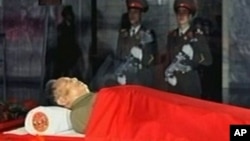As North Korea undergoes a tightly guarded political transition following the death of Kim Jong Il, many South Koreans are closely watching for signs of instability. The government in Seoul is taking steps to shore up the economy and reassure investors, and so far it appears to be working.
South Korean regulators are keeping an eye on food prices and other basic commodities on sale at markets.
In 1994, after the death of North Korea’s founding leader, Kim Il Sung, the uncertainty in North Korea translated into anxiety in the South. Fearing the worst, South Koreans went on panic-buying sprees, stockpiling basic staples.
But the passing of Kim Jong Il has led to a different situation, says Lim Soo-ho, an analyst at the Samsung Economic Research Institute in Seoul.
"Many people believed that the South Korean economy would suffer a significant shock after the death of Kim Jong Il," Lim says via translator. But the impact was limited to only two days and now the market is stable again. Lacking any other provocations or instability, he says he does not see any other impact from Kim’s death.
Lim says consumers here are not too worried about perceived instability in North Korea. South Koreans, he says, believe the situation always returns to normal with little or no impact to their lives, adding that South Korean government is not provoking North Korea and reassuring its own public about the situation.
The South Korean stock index, the KOSPI, did drop by a few percentage points immediately following the news of Kim’s death on Dec. 19. But Lim says it recovered once the Moody’s credit rating agency said that South Korea’s rating would not be affected.
The foreign business community in Seoul also feels confident in the economy here, says Tom Coyner, president of Soft Landing Consulting. He says, compared to other unexpected provocations from North Korea, like the 2010 shelling of the South’s Yeonpyeong Island, Kim Jong Il’s death did not make any noticeable difference in Korea’s business climate.
“The business community usually looks at things normally a year and a half to a three-year basis," says Coyner. "Korea seems to be a country that operates on a crisis-du-jour basis, so we have Kim Jong Il dying, but gosh that’s not a big unexpected event, we knew he was in poor health and the business environment is taking it in stride.”
But Coyner says given the little information available about Kim Jong Un, the son of the late ruler who is expected to take over, investors and other business leaders will have to wait and see how things play out.
Other observers say Kim Jong Un, who received education in Switzerland, might be more likely to open up North Korea’s economy than his predecessors. And that is good news for South Korea.
Hank Ahn, investments commissioner at Korea Trade-Investment Promotion Agency (KOTRA), a government agency that promotes doing business in South Korea, thinks it is likely the north will open up.
“It's quite natural we can assume that North Korea will eventually open up its economy to the outside world," he says. "So it’s better for us: We can reduce our unification costs when the two countries are reunified, even if we don't know when. And besides, we can export our products to North Korea as well.”
For now, opening North Korea’s economy will be a lower priority to more immediate concerns. The nation is in an official mourning period and all energy is focused on preparing for Kim Jong Il’s funeral on Dec. 28.
S. Korean Economy Strong Despite North's Transition




